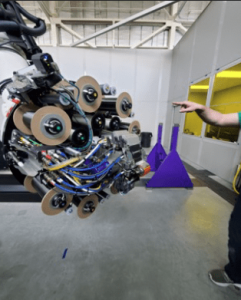Space
The ACC will be housed in a 16,000 sq. ft. UW facility available at Sand Point (Magnuson Park Building 5A, 7561 63rd Ave NE, Seattle, WA, 98115). This space includes manufacturing floor, classroom and presentation space, grad student suite, fully-equipped conference room, technical office, and (shared) industry-user office. The center has equipment for research, validation and acceleration of composite materials, structures, software and production. Additionally, the center facilitates composites educational and outreach efforts. The ACC facility equipment will be available as a cost center for other UW and external users.

Equipment
ACC users have broad access to equipment needed for composites research such as automated fiber placement system, autoclaves, ovens and hot presses for specimen fabrication, router and fabric cutters for fabricating the conducting embedded layers; various machine tools such as molding machines and CNC machines, electromechanical test frames for static tests and servo-hydraulic test frames for cyclic fatigue tests; and the associated test frame accessories such as load cells, and data acquisition systems.
Additionally, ACC users can leverage facilities at the UW such as the Molecular Analysis Facility (MAF), located on the ground floor of the Molecular Engineering and Sciences Building on the UW campus, the Instrumented Test Facility maintained in the UW Mechanical Engineering Department, the Advanced Material Characterization lab in the UW Materials Science and Engineering Department, and the Advanced Testing Lab maintained in the UW Aeronautics and Astronautics Department.
AFP System
The ACC provides a robotic Automated Fiber-Placement (AFP) system made by Electro-Impact (EI), capable of manufacturing high-contour (complex) components, which can adapt to different geometries and part sizes. The AFP machine, acquired by ACC through a public-private partnership between WA-state and Composites Industries, is capable of laying thermoset, thermoplastic, or dry fiber material form. The EI AFP system includes a Standard Modular Process 8-Tow Head (end-effector) technology. Electroimpact’s Variable Spot Size Laser heater enables high-power heating required for thermoplastic materials. This laser has a very high energy density, allows microsecond changes in the energy applied for precision temperature control, and has optics to shape the beam to accurately cover the width of the composite tow. Positioning is achieved using an Electroimpact modified and upgraded Kuka KR1000L750 Titan combining high speed, high payload, and long reach for flexible motion. The robot is track mounted for an additional 7th axis. A Vertical Turntable for complex parts. The system uses a Siemens 840D controller and industry standard VCP programming from CGTech. Additionally, the ACC has AFP simulation software from CGTech called VCS. VCP and VCS have post processing capability that is completely open to the user to facilitate research using the AFP robot.
MAF
The MAF is an instrumentation facility for micro- and nanoscale imaging and characterization. It is managed by 7 full time technical staff members. It operates as an open-access cost center and provides access to UW users at a discounted rate. It has a range of equipment including scanning electron microscopes (SEM) (FEI Sirion and ThermoFisher Apreo-S), a transmission electron microscope (TEM) (FEI Tecnai), in-situ and standalone nanoindentation tools (Alemnis ASA and Bruker Hysitron TI 980), a suite of AFM systems (Bruker ICON, Asylum Research Cypher and Molecular Vista Photoinduced Force Microscope (PiFM)), a dual beam microscope (SEM/FIB) (FEI XL830), sample preparation tools including an ultramicrotome (Leica EM UC6) and an ultrasonic disc cutter (Fischione 1050), and a range of other characterization tools including XRD, XPS, Raman Spectroscopy and SIMS.
Instrumented Test Facility
The UW Mechanical Engineering Department (ME Dept.) maintains a range of large-scale instrumented testing and characterization equipment, including a mechanical test load frame (Instron 5585) with digital image correlation capability, an instrumented drop tower (Dynatup 9250), a fatigue testing machine (Instron 8511), an immersion type ultrasound scanner (Mistras UPK-T24), a metal 3D printer (Arcam A2X), a polymer selective laser sintering testbed [100W CO2 laser, 250mm x 250mm layer dimension, validated for PA12 and tested with PEEK], and an X-Ray computed tomography (CT) system (NorthStar). The ME Dept. also maintains a machine shop with a full-time technical staff that coordinate a range of fabrication tools including computer-controlled mills and lathes, waterjet cutters, 3D printers and laser cutters.
Advanced Material Characterization lab
The UW Materials Science and Engineering Department maintain a comprehensive sample preparation and material characterization facility for composites including DMA (TA Instrument Discovery 850), DSC (TA Instruments Q20), FTIR (Bruker Vertex 70), TGA(TA Instruments Q50), SEM, Buehler Auto polisher for composites, microscopes, autoclave, ovens, high temperature furnaces, clean lay-up room, carbon-fiber 3D printer and universal testing machine (MTS –100 kN).
Advanced Testing Lab
The UW Aeronautics and Astronautics Department maintains a lab equipped to handle all challenges associated with testing various material specimens. For the mechanical characterization three MTS closed-loop servo-hydraulic load frames are available. The capacities cover a wide range from 20,000 lbs (89 kN), to over 110,000 lbs (490 kN). A multitude of additional load cells of various capacities as well as extensometers and LVDTs of various travel complement an effective testing facility. The state of the art 24 bit universal data acquisition system quantumX from HBM can be used stand-alone are as external conditioning system for the MTS load frames for various tasks. A VIC-3D digital image correlation system from Correlated Solutions adds the ability to obtain full displacement, and, by derivation, also strain fields. State-of-the art solutions for digital manufacturing of components for testing and data acquisition are available as well.